Contents
Cucumber Ant f1 – a newly created parthenocarpic vegetable has already found its fans among gardeners, housewives and garden lovers on the balcony. The variety is good because it can grow not only in open ground. It bears fruit even on the windowsills. Beautiful smooth fruits will decorate any table. Especially if you grow f1 ant cucumbers in such a way that for the New Year the family will be provided with their own fresh fruits.
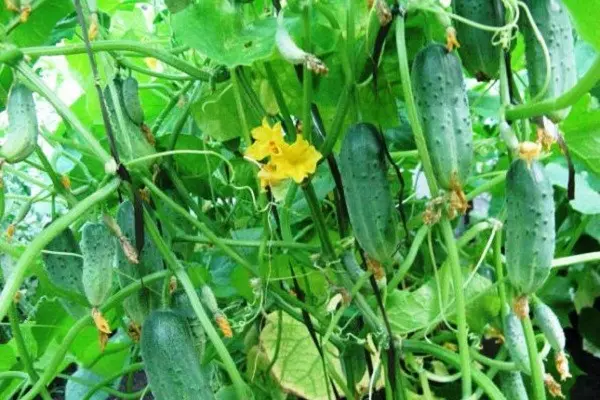
History of variety breeding
The breeding of the hybrid variety of cucumbers Ant f1 was carried out by the agricultural company “Manul” – one of the leading originator companies in Our Country. In addition to the Ant, the company has developed such long-known varieties as Amur, Zozulya, Amur and others.
The hybrid Ant was introduced and entered into the register of breeding achievements in 2003. As is customary in the production of any other hybrids of the variety, the firm keeps the founders secret. Ant cucumber seeds must be purchased from the manufacturer. It is impossible to breed a hybrid at home.
Ant f1 is recommended for cultivation in the regions north of the Caucasus:
- North Caucasian;
- Volga-Vyatka;
- Central Black Earth;
- Central;
- Northwestern;
- North.
The variety is not suitable for industrial cultivation by large agricultural holdings. It is recommended for small farms and private farmsteads. The optimal growing conditions for Ant f1 are greenhouses. But cucumber also grows well in open ground.
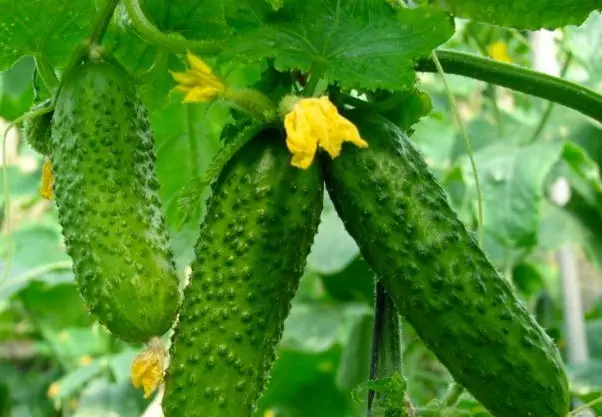
Description of the variety of cucumbers Ant
Cucumber variety Ant is a medium-sized plant with short side shoots. The bush is indeterminate. The main growth goes along the length of the main stem. The Ant branches little and reluctantly. Due to the peculiarities of growth, it requires a mandatory garter. The plant is parthenocarpic, that is, it does not require pollination by bees. This allows the cucumber to feel good in the greenhouse and on the windowsill in the apartment.
In a healthy bush, the leaves are slightly wrinkled, dark green. The edge of the sheet is slightly wavy. The size is average.
Flowers are female. Grow in bunches of 3-7 flowers each. The ovaries are formed on the 38th day after the appearance of the first true leaves in seedlings.
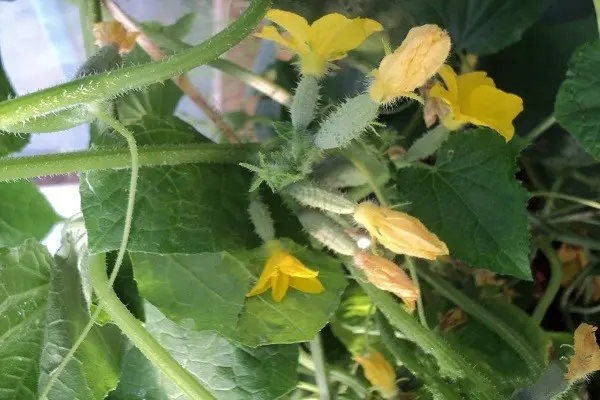
Description of fruits
Cucumbers in commodity form have the correct cylindrical shape. The fruits are even, slightly ribbed. Length 5-11 cm. Diameter 3-3,4 cm. Weight of one cucumber 100-110 g. The fruit is densely covered with large tubercles. The spines on the tubercles are white. The skin of the cucumber is green, with white stripes that reach the middle of the fruit.
The pulp is dense, crispy, juicy. There are no voids inside. This variety is devoid of bitterness at the genetic level.
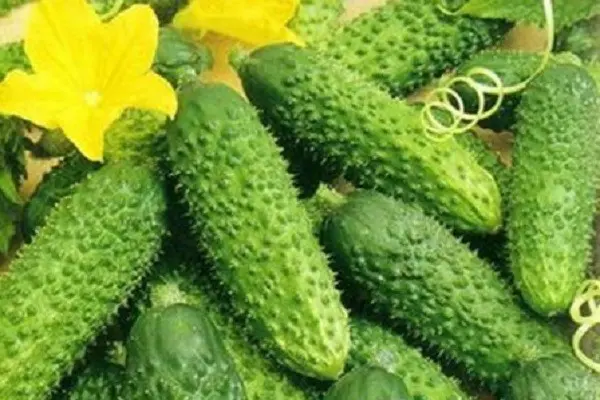
Characteristic of the variety
Ant f1 refers to ultra-early varieties that begin to form ovaries on the 38th day after the appearance of the first true leaves. Ant f1 begins to bear fruit 1-2 weeks earlier than other varieties of cucumbers. But the yield of a variety largely depends on compliance with the rules for its cultivation. With improper cultivation, not only the yield decreases, but also the quality characteristics deteriorate.
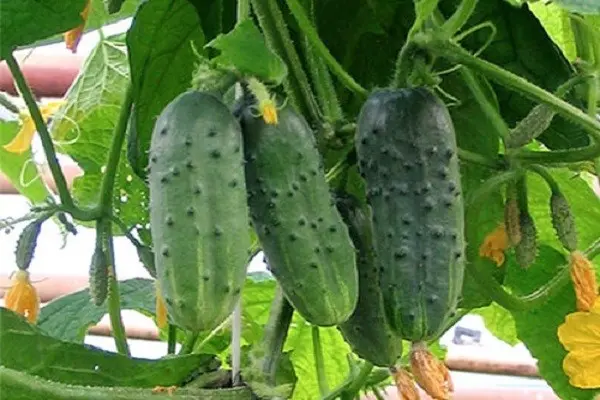
Yield and fruiting
Cucumbers ripen 1-1,5 months after the formation of the ovaries. When grown in open ground, Ant f1 is able to pour even with slight cold snaps. The yield of the variety is 10-12 kg / m².
If there is not enough sun for the flowers, the ovaries will not form. This is the main reason affecting the yield of the Ant f1 hybrid. With enough sunlight and nutrients, cucumber consistently produces high yields.
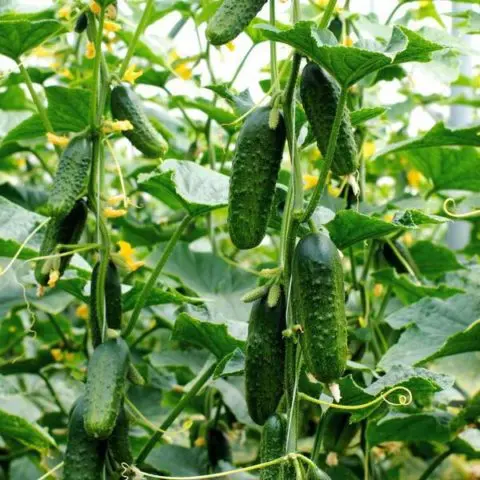
Application area
Ant f1 is a versatile variety, suitable both for fresh use and for home-made preparations. Due to its small size and regular shape, cucumber is popular with housewives as a vegetable for preservation. The palatability of the variety is high both in fresh and canned form.
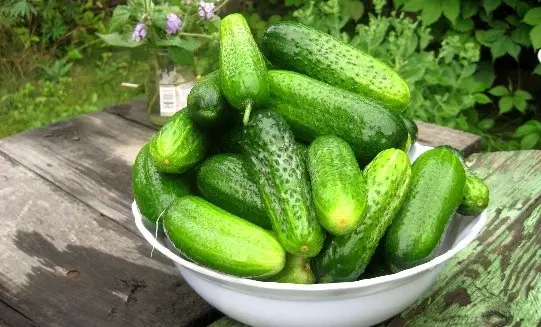
Disease and pest resistance
The hybrid Ant f1 at the genetic level has resistance to the main diseases of cucumbers:
- powdery mildew;
- olive blotch;
- ordinary cucumber mosaic;
- brown spotting;
- downy mildew.
For these qualities, the variety is very much appreciated by small farmers who cannot afford large crop losses due to diseases and are looking to cut costs. The ability not to spend money on chemicals for diseases is a considerable advantage in the competitive struggle.
Protection from omnivorous insects and mollusks has so far been managed only for potatoes, and then at the level of genetic engineering. Therefore, Ant f1 is exposed to pests in the same way as any other variety.
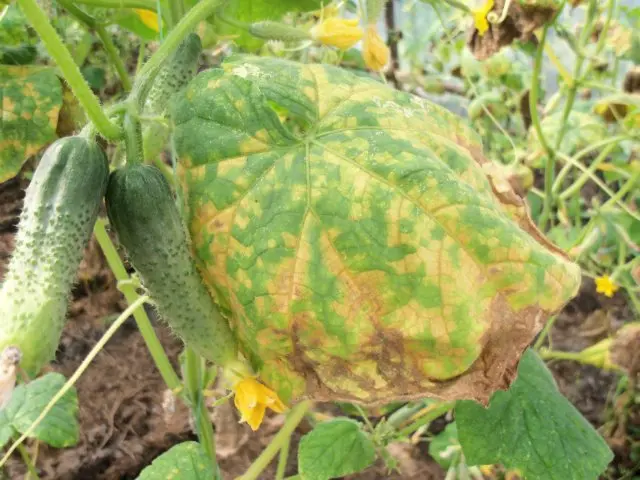
Advantages and disadvantages of the variety
According to gardeners, the Ant cucumber variety has only one serious drawback: you cannot get seeds for self-breeding from it. Even if you manage to pollinate the flowers, the second generation of cucumbers will lose their commercial and taste characteristics.
Otherwise, the hybrid notes only advantages:
- only female flowers on the whip;
- no need for insect pollinators;
- unpretentiousness;
- short fertility;
- ultra-early fruit formation;
- high yield, little dependent on the weather (the effect of weather on greenhouse plants is always minimal);
- good taste;
- excellent presentation;
- resistance to pathogenic microorganisms.
Unpretentiousness and inherent genetically high yield do not cancel the rules for caring for a cucumber if the owner wants to get a lot of high-quality fruits.
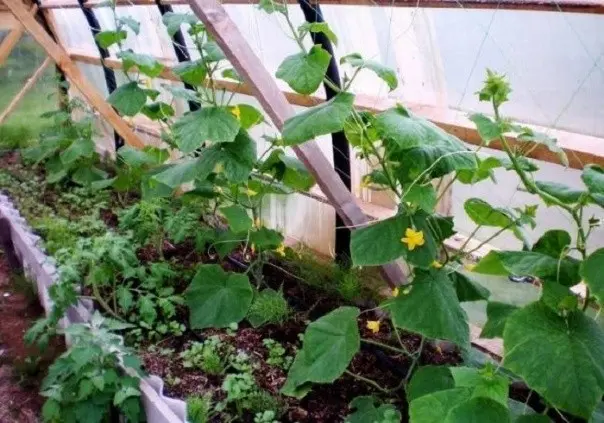
Rules of landing and care
Planting and care is carried out in the same way as with other indeterminate varieties of cucumbers. Planting rates for the variety Ant f1: 3 bushes per 1 m² in the greenhouse and 3-5 per 1 m² in the open field. Having enough space when growing outdoors is not critical. Enough to put a few props.
When growing a cucumber in a greenhouse, care must be taken that the internal volume of the structure is large. This variety needs lighting.
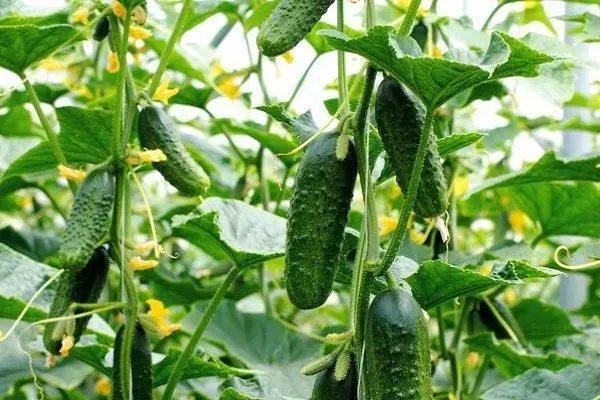
Planting seedlings
Ant seedlings begin to be prepared at the end of April. The nutrient mixture for seeds is either prepared independently or bought in a store. Before planting, the seeds are soaked for several hours. Disinfection is not required, as Ant seeds are commercially available and must already be disinfected or initially free of infective microorganisms.
Any plant does not tolerate a transplant with open roots. Cucumber seeds are large and planting them one at a time is not difficult. For a good survival rate of seedlings, they take a small container, which is filled with soil and 1-2 cucumber seeds are planted in it.
Seedlings are planted in the ground after the appearance of 3-4 true leaves, if the soil has warmed up to + 10-15 ° C.
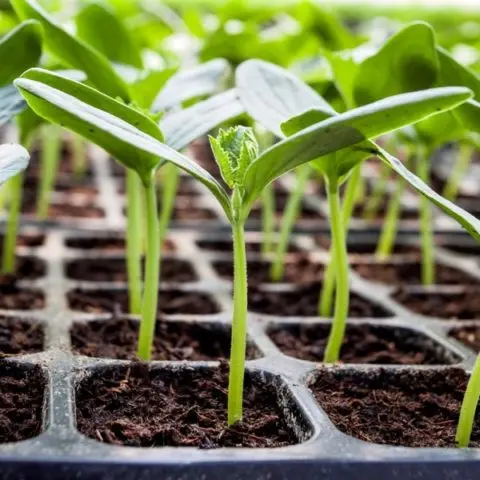
Growing cucumbers without seedlings
With direct planting in the ground, the seeds are immediately planted in such a way that there are no more than 5 adult plants per 1 m². The minimum rate is 3 bushes per 1 m², so even if some lashes die, there will be no crop loss. At first, the beds are covered with a film to protect them from night frosts and drying out of the soil.
When planting cucumbers directly in open ground, the formation of the crop will begin later than when planting seedlings, since the seeds can be planted no earlier than the soil warms up. At the same time, seedlings are also planted, which are usually about 2 weeks old. Otherwise, the rules for planting seeds in open ground are similar to the rules for planting seeds for seedlings.
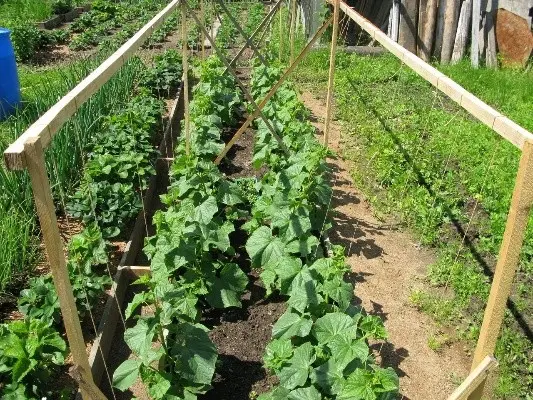
Aftercare for cucumbers
Cucumber is a vine capable of producing roots from the stem. When planting seedlings in a permanent place, the stem is slightly deepened so that the plant gives additional roots. After planting seedlings care is normal. To get rid of weeds and avoid the appearance of an earthen crust near cucumber bushes, you can mulch the soil.
The earth is periodically loosened. Cucumbers are fed with fertilizers.
When growing an Ant in a greenhouse, 2 options are possible:
- greenhouse – a building above the land;
- the greenhouse is separated from the ground, and cucumbers are grown in a special substrate.
In the first case, although the Ant cucumber variety is resistant to diseases, there may be insect larvae in the soil. With a high concentration of pathogenic bacteria, they can even break through the Ant’s immunity.
The second option is more often used in greenhouses when growing large volumes of vegetables for sale. The fertile substrate is placed in containers completely separated from the natural soil. Vegetables are grown in this substrate. The advantages of isolated cultivation are that there are no pests and pathogens in the substrate. When the substrate is depleted or pests appear in it, the soil is easy to replace.
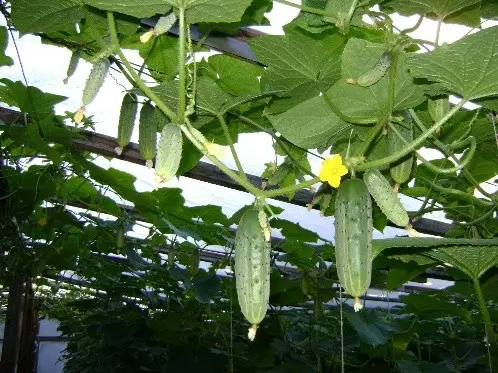
Shrub formation
This variety of cucumbers has the ability not to produce long side shoots. But the main stem does not stop growing after the first bunch of flowers and continues to grow further. Pinching the Ant is not required, but it is necessary to ensure the free growth of the main stem in length.
The ant will not form cucumber ovaries in shaded areas of the whip. Therefore, the whip is neatly straightened by tying. A good option is to “launch” a cucumber lash along the ceiling of the greenhouse.
Conclusion
Cucumber Ant f1 is suitable for growing in almost any conditions. An exception may be only too hot regions. Housewives who prefer home-made preparations to store purchases are also satisfied with this variety.









